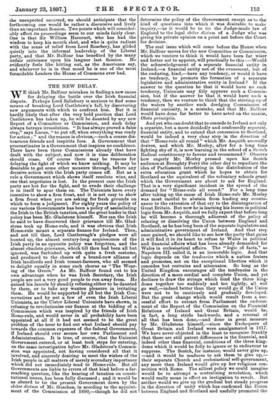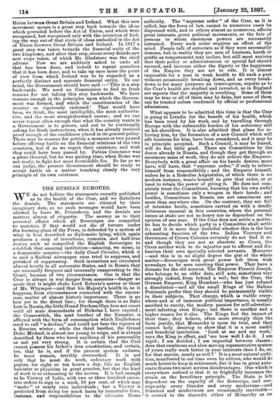THE NEW DELAY.
WE think Mr. Balfour mistaken in finding a new cause for delaying the battle over the Irish financial dispute. Perhaps Lord Salisbury is anxious to find some means of breaking Lord Castletown's fall, by discovering new arguments with which to confront him. But it is hardly likely that after the very bold position that Lord Castletown has taken up, he will be daunted by any new Report of a Committee or Commission, and such delay always betrays irresolution. "It has always proved a false step," says Lucan, "to put off, when everything was ready for action ; " and the reason is obvious,—such a course dis- heartens friends and inspirits foes. A Government that procrastinates is a Government that inspires no confidence. There have been three Commissions already that have dealt with the subject, and now it is time deliberation should cease. Of course there may be reasons for delaying the fight of which we know nothing. It may be desirable to get some other measure through, before any decisive action with the Irish party comes off. But as a rule a Government which shows itself resolute wins, and one that negotiates is lost. In the present case the Irish party are hot for the fight, and to evade their challenge is in itself to spur them on. The Unionists have every incentive to show a firm front, and it is not easy to show a firm front when you are asking for fresh grounds on which to form a, judgment. For eighty years the policy of our various Governments has been a policy of assimilating the Irish to the British taxation, and the great leader in that policy has been Mr. Gladstone himself. Nor can the Irish be said to have discovered their grievance till Mr. Glad- stone took up Home-rule, and it was obvious that Irish Home-rule meant a separate finance for Ireland. Then, and not till then, Lord Castlereagh's pledges were all hunted up, the almost century-long acquiescence of the Irish party in an opposite policy was forgotten, and the almost obsolete grievance, which till then had been all but ignored, was furbished up with quite a fresh costume, and produced to the cheers of a brand-new alliance of Irish landlords and Irish tenant-farmers, who all seemed to delight equally in some such chorus as "The Wear- ing of the Green." As Mr. Balfour found out to his own advantage when he was Irish Secretary, the Irish people are not a very good people to run away from. He gained his laurels by steadily refusing either to be daunted by them, or to take any wanton pleasure in irritating them. He would be supported by all but the Irish Con- servatives and by not a few of even the Irish Liberal Unionists, as the Ulster Liberal Unionists have shown, in refusing to revolutionise our finance at the bidding of a Commission which was inspired by the friends of Irish Home-rule, and would never in all probability have been appointed at all if it had not seemed to be the great problem of the hour to find out what Ireland should pay towards the common expenses of the federal Government, if Ireland should ever secure her own Parliament and Administration. It is true, of course, that the Unionist Government entered, or at least took steps for entering, on the same investigation before Mr. Gladstone's Commis- sion was appointed, not having considered all that it involved, and sincerely desiring to meet the wishes of the Irish people in all matters of merely secondary importance which did not immediately tend to Home-rule. But all Governments are liable to errors of that kind before a far- reaching question, like the bearing of taxation on consti- tutional issues, has been fully discussed ; and it would be as absurd to tie the present Government down by the °biter dictum of Mr. Goschen, in acceding to the appoint- ment of the Commission of 1890,—though he did not determine the policy of the Government except as to the kind of questions into which it was desirable to make inquiry,—as it would be to tie the Judge-made law of England to the legal obiter dictum of a Judge who was giving his private opinion on a point not before the Court for decision.
The real issue which will come before the House when Mr. Balfour moves for the new Committee or Commission, which we venture to think it would have been far wiser and better not to appoint, will practically be this :—Would the acknowledgement of a separate financial entity in Ireland,—a financial entity not of the evanescent, but of the enduring, kind,—have any tendency, or would it have. no tendency, to promote the formation of a separate legislative and administrative entity in Ireland ? If the answer to the question be that it would have no such tendency, Unionists may fitly approve such a Commis- sion, but if the answer be that it would have such a tendency, then we venture to think that the stirring-up of the waters by another such dredging Commission of financial curiosity, is a mistake, and that Mr. Balfour would have done far better to have acted on the maxim, Obsta principiis.
And yet who can doubt that to concede to Ireland not only a, separate, but a more decidedly and confessedly separate, financial entity, and to extend that concession to Scotland, would be indeed a very clear step in the direction of that "Home-rule all round" which Mr. Asquith avowedly desires, and which Mr. Morley, after for a long time fighting shy of it, is now learning in the school of a Scotch Radical constituency to favour and recommend ? Observe how eagerly Mr. Morley pressed upon his Scotch audience at Broughty Ferry the other day to repudiate the idea of Parliament interfering in the distribution of the extra education grant which he hopes to obtain for Scotland as the equivalent of the voluntary schools grant which the Government are about to ask for England. That is a very significant incident in the spread of the demand for "Home-rule all round." For a long time after taking up the cause of Irish Home-rule Mr. Morley was most careful to abstain from lending any counte- nance to the extension of that cry to the disintegration of Great Britain. But now he is learning his lesson in political logic from Mr. Asquith, and we fully expect that before long he will become a thorough adherent of the policy of relaxing or dissolving the Union between England and Scotland, as he has long been of the separate legislative and administrative government of Ireland. And that step once gained, we should like to see how the party that gains it will find it in its heart to refuse to Wales in political and financial affairs what has been already demanded for Wales in ecclesiastical affairs. The "logic of facts," as Napoleon III, called it, is an inexorable logic. And that logic depends on the tendencies which a nation fosters and promotes, not on the exceptional liberties which it concedes but restrains and attenuates. So long as the United Kingdom encourages all the tendencies in the direction of a more cordial and complete Union, and yet declines to draw the strings which bind the three king- doms together too suddenly and too tightly, all will go well,—indeed better than they would go if the Union were not to be cautiously and gradually developed. But the great change which would result from a suc- cessful effort to extract from Parliament the endorse- ment of the Report of the Commission on the Financial Relations of Ireland and Great Britain, would be, in fact, a long stride backwards, and a reversal of all that has been done,—and done in great measure by Mr. Gladstone himself,—siuce the Exchequers of Great Britain and Ireland were amalgamated in 1817. We have never objected in the least to recognise frankly that there are still patent differences in the financial, and indeed other than financial, conditions of the three king- doms which it would be folly to ignore or to endeavour to suppress. The Scotch, for instance, would never give up, —and it would be madness to ask them to give up,— their separate Church and ecclesiastical self-government, any more than Ireland would give up her religious con- nection with Rome. The silliest policy we could imagine would be to attempt a centralising revolution, which would really mean in effect an instigation to revolt. But neither would we give up the gradual but steady progress in the direction of unity which has confirmed the Union between England and Scotland and usefully promoted the Union between Great Britain and Ireland. What this new movement means is a great step back towards the ideas which prevailed before the Act of Union, and which were recognised, but recognised only with the intention of find- ing the way out of that circle of ideas embodied in the Act of Union between Great Britain and Ireland. In 1817 a great step was taken towards the financial unity of the two kingdoms, and after that step, about every decade saw new steps taken, of which Mr. Gladstone was the chief adviser. Now we are suddenly asked to undo all that has been done, and indeed to repent ourselves that it has been done, and to take up once more the point of view from which Ireland was to be regarded as a perfectly distinct and separate financial entity. To our mind, the Government should have said :--1 This is a step backwards. We need no Commission to find us fresh reasons for not taking this step backwards. We have reasons enough in the principles upon which the Govern- ment was formed, and which the constituencies of the -country so vigorously endorsed.' That would have been, we think, the most intelligible, the most authorita- tive, and the most straightforward course ; and we can clever repeat often enough that what the country wants in a. Government is to govern, and not to be continually asking for fresh instructions, when it has already received proof enough of the confidence placed in its general policy. There may be reasons for getting a measure or two passed before offering battle on the financial relations of the two countries, but if so we regret their existence, and wish thei could have been passed by. Fabius Cunctator was a great General, but he was gaining time, when Rome was not ready, to fight her most formidable foe. So far as we can judge, the present Government should be ready to accept battle on a matter touching closely the very erinciple of its own existence.



































 Previous page
Previous page